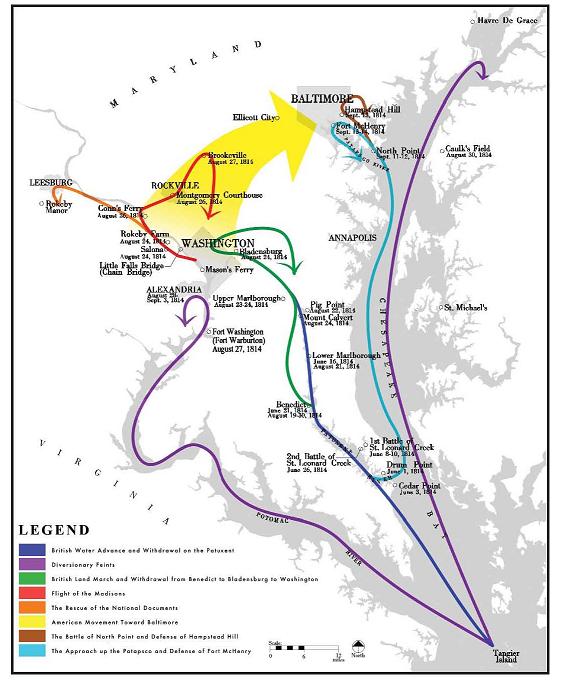POSTSCRIPT
Sunday Night , 9
o'clock.
We stop the
press to publish the following interesting information, just received from our
correspondent at Benedict - - Nat. Int.
BENEDICT, JUNE 26
Sunday morning 6 o'clock
"There
has been since day–break they continued firing in St. Leonard's creek. Having been this morning on a high hill
above this place, I have both seen and heard it.
The mass of
several very large British vessels are distinctly seen with a glass over the
land which intervenes, and the smoke of every gun is visible as it rises above
the trees.
We are in
fear for Barney, the British having been greatly reinforced, as appears by the
number of vessels there. On the first news which reaches us of the results, I
will write you."
 _________________________
_________________________
Postscript No. 2.
BARNEY VICTORIOUS!
Patriot office, 3
o'clock Monday.
We have
just seen a gentleman from St. Leonard's Creek, whose date, that
On Sunday morning Com. BARNEY attacked the enemy, consisting of a razee and frigate, and
after an action of one hour and a half, compelled them to set sail and stand down
the River — the Commodore then come
[sic] out of St. Leonard's Creek and stood up the Patuxent.
On their way down, off point
patients, the British part Dr. Somerville's house. The British were set fire to
three times by hotshot.— Three killed and eight wounded on board the Flotilla.
_________________________
MARSHALL'S SALE.
United States,
Maryland District.
By virtue and pursuance of an order to me directed,
from the Hon. James Houston Esq. judge of the District Court of the United
States, in and for Maryland District, will be exposed to Public Sale, at the
lower end of Frederick–street Dock, on FRIDAY, the first day of July next, at
11 o'clock, for cash,
The Schooner
MIRA,
her
Tackle, Apparel, and furniture, as she now lives.
THOS.
RUTTER, Marshall.
June
24
_________________________
SALE BY AUCTION.
On TUESDAY, the 28th inst.
at 10:30 o'clock, at the Auction Room head of Frederick Street Dock—
A
Variety of Dry Goods,
And
at 12 o'clock,
10
pipes French Brandy (high proof & well flavoured, warranted pure, as
imported)
50
cases Old Claret, imported in 1810
11/2
pipes Teneriffe Wine
15
cases Martinique Cordial
five
have pipes Madeira Wine
12
hhds Muscovado Sugar
50 bags St. Domingo Coffee
10 tierces fresh Rice
three chests Hyson Skin Tea.
Wm. VANCE
& Co, Auc'ts
June 25
_________________________
Charitable Marine Society of
Baltimore.
The Stated Yearly Meeting of this Society, for the election
of officers, collection of dues, and the transaction of other important
business, will be held on MONDAY, the 27th instant, at 7 o'clock, P. M. At Pamphillion's
Hotel, Fell's Point.
Punctual
attendance of the members is respectfully requested on this occasion; and the
payment of all arrearages and dues is most earnestly solicited.
By order of
the Pres.,
NATHANIEL KNIGHT,
Sect.
June 23
_________________________
50 Dollars Reward.
—
DESERTED on the 23d inst.
in full uniform, which he may have since changed, WILLIAM HUTTON, born in Cumberland
county,Penn aged 27 years, 5 feet, 10 1-2 inches high, fair complexion, grey
eyes, black hair and by profession a Shoe Maker, but is fond of driving horses,
and has been hired for a siege driver; as a mother and several relatives in
Baltimore, where it is supposed he is now lurking. The above reward will be
given to any person who will take up said deserter and deliver him to the
commanding officer of this place, or by any other officer to whom he may be
delivered, who commands a post, Garrison or district.
F.
EVANS Capt. Art.
Fort M'Henry.
June 24
_________________________
100 DOLLARS REWARD.
On Friday Evening, t10th inst. a White Trunk marked G. Paul,
Baltimore, with leather straps buckled on each in, was missed from our store,
containing very valuable Goods.
It may have
been delivered to some person in mistake, in which case a generous reward will
be given for its return, if required; but is stolen and any of the articles
enumerated below offered for sale, we caution the public against purchasing
them, and offer a large reward for the chief if convicted of the act, or $100
for the recovery of the goods— contents as follows:
22 India Mulmul
embroidered Dresses
16 do do Children's Frocks
7 pieces
colored cambric Shawls
2 1-2 do 8-4 Levantine
Shawls
5 do embroidered do do
8 doz. Ladies'
short white Kid Gloves
6 do Silk Handkerchief
3 band–boxes fringed
playing Ribbons, Nos. 3,4, and 4-7
1 band–box Silk
Cords, 35 pieces.
WM. M'DONALD & SON.
The
National Intelligencer, at Washington will please copy the above eight times,
daily.







